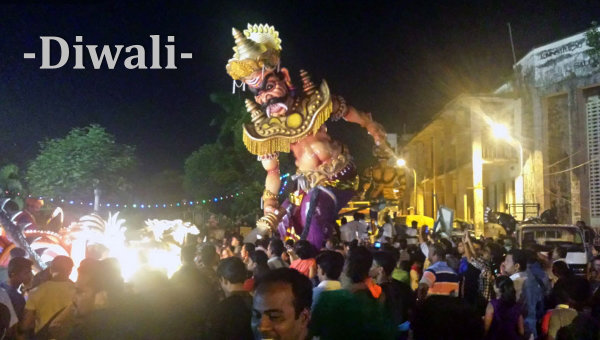By Tyson Thorne

In Paul’s first letter to the church in Corinth, he provides advice as to how to respond to a certain social situation that, while probably a common occurrence in his day, isn’t so relevant in today’s culture: what to do when you are a dinner guest who discovers the main course was sacrificed to an idol (1 Corinthians 10.27-31). In fact, in teaching the passage in Bible studies and sermons over the years, I used to make a small joke about its relevance. Imagine my surprise when I found myself in a situation this passage applies to. Yep, happy Diwali.
I work in the tech industry, and a lot of tech workers are from India. In a company of size, and that even has a facility in India, a good percentage of our workforce shares a Hindu heritage. When our vice president of technology decided to pay a visit from the home office, it wasn’t a big surprise. He makes the trip about once a quarter. What was surprising is that he was visiting us on a Hindu holiday of Diwali, and he wanted to celebrate with all of us. Today, at lunch, they are serving a traditional Diwali meal. Those from India will be wearing clothing fitting for the festivities. It sounded like an interesting way to experience another culture. The VP described the holiday as such:
Diwali is known as the Festival of Lights and I cannot think of a more beautiful way to describe it or do it justice. On festival nights, many people light small lamps, or Diyas, to symbolically dispel darkness from their lives and replace it with light.
Sounds great. I accepted the invitation to the lunch, even though it conflicted with lunch plans I made with friends. After all, it’s important to please the boss, right?
That’s when I decided to find out a little more about the holiday. It turns out it was everything the VP said it was, and a little bit more. From Wikipedia:
Before Diwali night… people participate in family puja (prayers) typically to Lakshmi – the goddess of fertility and prosperity… On the same night that Hindus celebrate Diwali, Jains celebrate a festival also called Diwali to mark the attainment of moksha by Mahavira, Sikhs celebrate Bandi Chhor Divas to mark the release of Guru Hargobind from a Mughal Empire prison, and Newar Buddhists, unlike the majority of Buddhists, celebrate Diwali by worshipping Lakshmi.
Diwali is a festival about dispelling darkness, to be sure, but it does so in the belief that two Hindu god’s did so epochs ago. As such, the entire festival period is marked by prayers and worship mainly to the goddess Lakshmi who is born of both the gods and demons of their religion. Suddenly, Paul’s teachings took on new relevance. I declined to attend the luncheon and instead stuck to my original plans. Was the right the right approach? I don’t know. Another strong Christian at my office decided to attend in spite of what I’d learned saying, “I’ll go and represent the love of Christ.” There is something to be said for that, all I can say is that, once I learned what the festival was about, my conscience was telling me to not participate. You can decide for yourself, after reading this final thought:
Am I saying that idols or food sacrificed to them amount to anything? No, I mean that what the pagans sacrifice is to demons and not to God. I do not want you to be partners with demons. You cannot drink the cup of the Lord and the cup of demons. You cannot take part in the table of the Lord and the table of demons. Or are we trying to provoke the Lord to jealousy? Are we really stronger than he is?
“Everything is lawful,” but not everything is beneficial. “Everything is lawful,” but not everything builds others up. Do not seek your own good, but the good of the other person. Eat anything that is sold in the marketplace without questions of conscience, for the earth and its abundance are the Lord’s. If an unbeliever invites you to dinner and you want to go, eat whatever is served without asking questions of conscience. But if someone says to you, “This is from a sacrifice,” do not eat, because of the one who told you and because of conscience – I do not mean yours but the other person’s. For why is my freedom being judged by another’s conscience? If I partake with thankfulness, why am I blamed for the food that I give thanks for? So whether you eat or drink, or whatever you do, do everything for the glory of God. – 1 Corinthians 10.19-31
|
|
